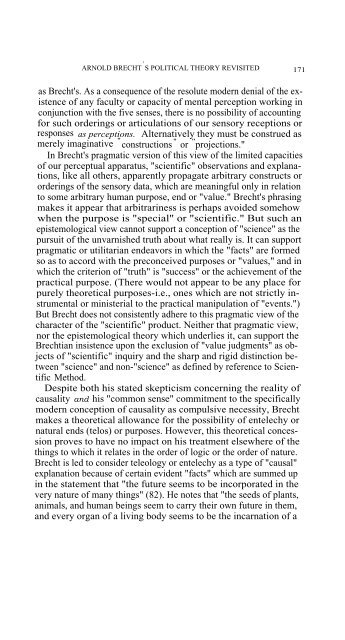ARNOLD BRECHT'S POLITICAL THEORY REVISITED Political ...
ARNOLD BRECHT'S POLITICAL THEORY REVISITED Political ...
ARNOLD BRECHT'S POLITICAL THEORY REVISITED Political ...
Create successful ePaper yourself
Turn your PDF publications into a flip-book with our unique Google optimized e-Paper software.
<strong>ARNOLD</strong> BRECHT ' S <strong>POLITICAL</strong> <strong>THEORY</strong> <strong>REVISITED</strong> 171<br />
as Brecht's. As a consequence of the resolute modern denial of the existence<br />
of any faculty or capacity of mental perception working in<br />
conjunction with the five senses, there is no possibility of accounting<br />
for such orderings or articulations of our sensory receptions or<br />
responses as perceptions. Alternatively they must be construed as<br />
merely imaginative " constructions " or " projections."<br />
In Brecht's pragmatic version of this view of the limited capacities<br />
of our perceptual apparatus, "scientific" observations and explanations,<br />
like all others, apparently propagate arbitrary constructs or<br />
orderings of the sensory data, which are meaningful only in relation<br />
to some arbitrary human purpose, end or "value." Brecht's phrasing<br />
makes it appear that arbitrariness is perhaps avoided somehow<br />
when the purpose is "special" or "scientific." But such an<br />
epistemological view cannot support a conception of "science" as the<br />
pursuit of the unvarnished truth about what really is. It can support<br />
pragmatic or utilitarian endeavors in which the "facts" are formed<br />
so as to accord with the preconceived purposes or "values," and in<br />
which the criterion of "truth" is "success" or the achievement of the<br />
practical purpose. (There would not appear to be any place for<br />
purely theoretical purposes-i.e., ones which are not strictly instrumental<br />
or ministerial to the practical manipulation of "events.")<br />
But Brecht does not consistently adhere to this pragmatic view of the<br />
character of the "scientific" product. Neither that pragmatic view,<br />
nor the epistemological theory which underlies it, can support the<br />
Brechtian insistence upon the exclusion of "value judgments" as objects<br />
of "scientific" inquiry and the sharp and rigid distinction between<br />
"science" and non-"science" as defined by reference to Scientific<br />
Method.<br />
Despite both his stated skepticism concerning the reality of<br />
causality and his "common sense" commitment to the specifically<br />
modern conception of causality as compulsive necessity, Brecht<br />
makes a theoretical allowance for the possibility of entelechy or<br />
natural ends (telos) or purposes. However, this theoretical concession<br />
proves to have no impact on his treatment elsewhere of the<br />
things to which it relates in the order of logic or the order of nature.<br />
Brecht is led to consider teleology or entelechy as a type of "causal"<br />
explanation because of certain evident "facts" which are summed up<br />
in the statement that "the future seems to be incorporated in the<br />
very nature of many things" (82). He notes that "the seeds of plants,<br />
animals, and human beings seem to carry their own future in them,<br />
and every organ of a living body seems to be the incarnation of a
















